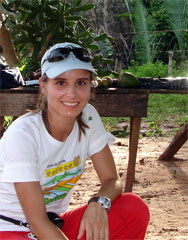


ADAI -LAETA (Associated Laboratory for Energy, Transports and Aeronautics)

Education
Links
Colaborations
Interview with Érica Castanheira, conducted by the Energy for Sustainability (EfS) initiative, published in the MIT-Portugal website

EC: I have learned about the PhD in Sustainable Energy Systems (SES) in 2008 through Professor Fausto Freire, after applying for a research position in the FCT Project “Biofuel systems for transportation in Portugal: An "well-to-wheels" integrated multi-objective assessment” at ADAI- LAETA, University of Coimbra. During the interview we have also discussed that it could be an excellent opportunity for my future career to apply for the SES doctoral program. At that time, I was finishing my master’s on Energy and Environmental Management at the University of Aveiro. My MSc thesis was about environmental life cycle assessment of agricultural products. A PhD on Sustainable Energy Systems permits to extend my previous research experience towards an emergent field integrating engineering, energy, economics and environmental systems analysis. Furthermore, the Energy for Sustainability (EfS) initiative at the University Coimbra brings together faculty from various teaching and research institutions, and offers an interesting and diversified number of courses.
EfS: What is your research project about?
EC: The overall purpose of my research project is the development of an extended life cycle methodology for the environmental sustainability assessment of bioenergy systems. Bioenergy has been proposed as a solution to several pressing concerns as energy security, climate change and rural development. However, accelerating growth in bioenergy demand has been accompanied by a growing concern about the environmental, economical and social impacts, such as deforestation, greenhouse gas emissions, related food competition, and land conflicts. The assessment of the environmental performance of bioenergy systems has hence become an important focus of research and debate within the scientific community.
The methodology that I am developing is based on the environmental life cycle assessment (LCA) of the entire bioenergy system, from the production of biomass to its use as an energy carrier, encompassing the land use change (LUC), cultivation and harvesting, transport, conversion to bioenergy products and co-products, not neglecting disposal/treatment of residues and the production and use of subsidiary inputs (e.g., agrochemicals, fuels and equipment).
EfS: What do you hope to achieve?
EC: My research aims to innovate along 3 interrelated lines: i) improve the LCA methodology to address local aspects and the effects of the LUC; ii) assess bioenergy alternatives based on the complementary use of Multi-Criteria Decision Analysis (MCDA) and LCA; iii) address uncertainty due to data quality and model choices. The methodology will be implemented to enable objective and transparent estimations and comparisons of different system options as scenarios as well as identification of optimum solutions that would lead to more sustainable bioenergy solutions. Comparison with fossil reference systems will also be made to quantify the benefits and problems of displacing fossil fuels. In this context, the research also aims at contributing to the development of decision tools to support the assessment and certification of sustainable bioenergy.
EfS: How do you think biofuels systems will evolve due to current pressures and recent standards that impose sustainability criteria?
EC: In 2003 the Europe Union (EU) imposed an ambitious target of 10% share of biofuels use in the transportation sector by 2020. However, due to current controversies, a new EU Directive was recently published (2009/28/EC) “on the promotion of the use of energy from renewable energy sources”, proposing a sustainability certification scheme for biofuels. This directive strengths the importance of defining and imposes sustainability criteria for biofuels, namely concerning greenhouse gases savings (an overall GHG saving of 35% in 2013, which will increase to 60% in 2018), impacts on biodiversity, water resources, water quality and soil quality.
In the USA, the Environmental Protection Agency (EPA) just finalized the Renewable Fuel Standard Program, which requires that the lifecycle GHG emissions of a qualifying renewable fuel must be lower than the lifecycle GHG emissions of the 2005 baseline average gasoline or diesel fuel that it replaces.
Therefore, the evolution of biofuel production will be strongly driven by sustainability issues. However, sustainability assessment is a complex topic where 3 dimensions must be addressed (environmental, social and economical) and there are substantial disagreements in current published bioenergy life cycle studies, due to differences in data, scenarios and modeling choices. Other problem is that current studies mainly focus on GHG emissions and other environmental impacts must be assessed (e.g. water consumption, soil quality, acidification, eutrophication, photochemical oxidation, ozone layer depletion and toxicity) as well as socio-economic impacts.
I think that bioenergy systems will increase and develop in the future, but, in the next couple of years, we have to work to establish a coherent and consistent methodology to assess and guarantee their sustainability and reduce the uncertainty of life cycle calculations, and this is a topic where I hope my thesis will give some contribution.
http://www.uc.pt/efs/destaques/profileEricaCastanheirahttp://www.mitportugal.org/profiles/student-profile-erica-castanheira.html